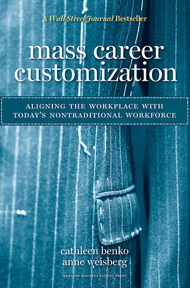
Title: Mass Career Customization
Authors: Cathleen Benko and Anne Weisberg
ISBN-13: 9781422110331
ISBN: 1422110338
Mass Career Customization
Book review by Joy Hopkins
Deloitte’s Cathleen Benko and Anne Weisberg team up in their book, Mass Career Customization, to apply a common concept in the consumer products industry to a new field – human resources. In seven concise, well-argued chapters, the two introduce a modern dilemma – our workforce is evolving to include individuals with a new genre of principles and habits, but our workplaces have not kept pace and are sticking to the old program. Not unlike Dell, who pioneered mass product customization with its made-to-order computers, Benko and Weisberg suggest it is time for corporate HR departments to offer the same to their employees in the form of careers, “mass career customization.”
The new genre of principles and habits of today’s workforce is largely the result of an influx of employees from Generations X (aged 23-37) and Y (under 23) who have very different ideas about what it means to be successful than their older counterparts, the Baby Boomers (38-57) and Mature workers (58 or older). The younger generations may be waiting longer to create families, but tend to be more family-centric, opting for extended maternity and paternity leave, and paths that cultivate more of a work-life balance. The younger generations also tend to be more opportunistic and less loyal to companies that do not meet their expansive needs. Put in the context of a shrinking pool of skilled labor that is projected well into the next decade, the authors suggest this should give weight to companies’ talent acquisition and retention concerns and prompt the creation of new programs that adapt to these changing needs.
What better program, of course, than that of mass career customization “MCC” which allows employees to charter their own career path based on their particular life stage each stage at a time. Even better, unlike traditional flexible work arrangements (FWAs) that are limited to one-off negotiations between manager and employee, MCC is scalable. Using the MCC framework, each employee can create their own profile, which consists of four clearly defined components (pace, workload, location/schedule, and role). Depending on the life stage, one can choose to dial up or down each component. This provides a framework that can be rolled out on a massive scale and baked into development discussions with managers across the board.
Benko and Weisberg warn that prolonged ignorance to the changing needs of the workforce will lead to major problems with attracting and retaining talent. The good news, they argue, is that adopting the principles of MCC has not (as evidenced in their pilot programs at Deloitte, at least) prompted a mass exodus from the more traditional tracks. In fact, their studies have suggested that more often than not employees want to dial up! MCC apparently has a lot of “option value” and giving employees the option to choose has proved to be an important factor in attracting and retaining talent, even if the majority of the talent pool opts for the traditional workload most of the time. The keys are choice and flexibility over time.
One criticism of the book is that it offers no solutions for small companies. Although several Deloitte-comparable establishments employ thousands of employees worldwide, Intel being no exception, the latest statistics from the U.S. Department of Labor are undeniable. The vast majority (>99%) of the United States’ 26.8 million businesses have less than 500 employees [1]. Yet Benko and Weisberg fail to dedicate even a paragraph to the different challenges these small companies are likely to face relative to their bigger counterparts in the marketplace.
Regardless of what the challenges may be in terms of mass-adoption, however, these two bright women have clearly made a strong case backed by empirical data and a good deal of common sense. Since publication of the book in 2007, the two have embarked on an ambitious travel schedule attending conferences around the globe. They even have a website where you can simulate your own MCC profile, accessible here. One thing is clear: these two are certainly on a roll to customizing their own careers and they’ve left us with some important nougats we can use to help convince our employer to allow us the same privilege.
[1] Source: Office of Advocacy estimates based on data from the U.S. Dept. of Commerce, Bureau of the Census, and U.S. Dept. of Labor, Employment and Training Administration.




